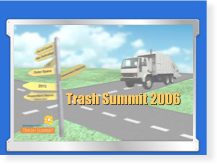Solid Waste Management Consulting
Planning and implementing solid waste management facilities and programs can be a complex and challenging task and one that can have far reaching impacts. As communities throughout the United States pursue solutions to their solid waste management challenges, it becomes more and more apparent that any one method or technology is not likely to offer a complete solution.
Value Added Consulting has the experience and expertise to ensure that our clients receive the best advice available. Our experience covers the complete spectrum of solid waste management including waste characterization, procurements of solid waste facilities and services, recycling programs, alternate technology evaluation, feasibility studies, and rate structure development.
Solid Waste Management Services provided by Value Added Consulting include:
- Strategic planning
- Procurement, negotiation and contract administration
- Technology evaluation and feasibility studies
- Revenue recovery approaches
- Rate structure analysis and development
- Recycling studies and implementation
- Expert witness
- Owner’s representative proposal evaluation
- Facility siting and implementation
Technology or Planning? Solid waste management challenges do not lend themselves to a one size fits all solution. Sometimes a more technical solution is needed, sometimes the “softer” efforts like planning, or changing cost recovery approaches, is called for. And sometimes a combination of the two.
Technical approaches may include development of new processing or disposal capacity, improving or expanding existing facilities, or evaluation of new technologies. It could be focused contract administration or performance management. Many of our projects fall into groups such as Waste-to-Energy, Recycling, Waste Processing/Conversion, Planning and Economic, and Landfill.
The optimum approach is shaped by factors such as geographic size, location, available transportation, population demographics, and regulatory climate. Our experience assisting communities with populations ranging from under 30,000 into the millions, from urban locations to isolated communities brings our clients a fresh perspective through which they can view their own situations.
Waste-to-Energy (WTE), also referred to as Resource Recovery or Energy from Waste (EfW) can be an important component of an integrated solid waste management strategy. This is particularly true in areas with limited area, high population density, or where the energy is critically needed such as certain islands, or developing areas. More….


